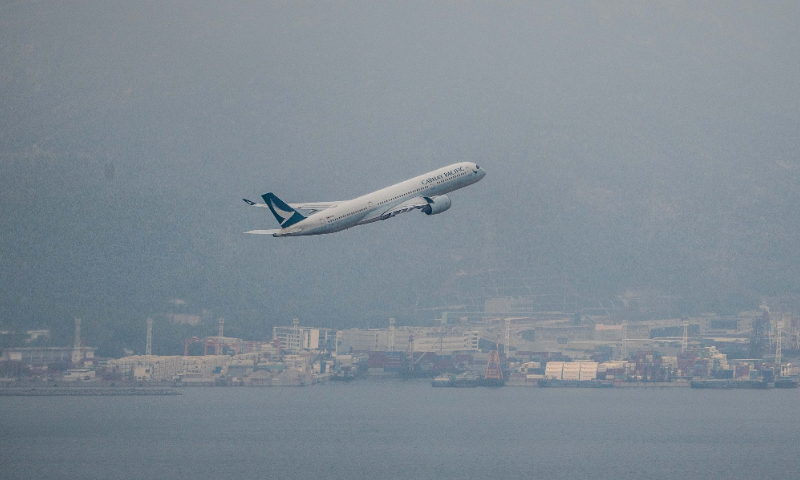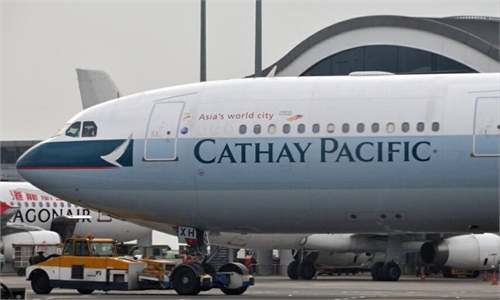HK chief executive criticizes Cathay Pacific over discrimination against non-English speakers

A passenger aircraft operated by Cathay Pacific Airways Ltd. takes off from the Hong Kong International Airport in Hong Kong, China, on March 7, 2022. Photo: VCG
The controversy sparked by the Hong Kong-based airline Cathay Pacific over discrimination against non-English-speakers continued to hold public attention on Wednesday. Local officials from the Hong Kong Special Administrative Region (HKSAR) government consider the incident "a serious matter," urging the airline to thoroughly review internal processes and prevent similar events from happening again.
The incident aroused a wider public discussion on Chinese social media about the Hong Kong-based airline's systematic discrimination against non-English speaking passengers as more Chinese netizens revealed similar experiences of being treated differently by the airline's flight attendants based on the language they spoke.
"I have proposed to Cathay Pacific Chief Executive Ronald Lam that the incident is a serious matter. Cathay Pacific must reflect on itself and similar incidents will not be allowed to happen again," said the HKSAR Chief Executive John Lee Ka-chiu on Wednesday. Lee noted that the relevant flight attendants' words and deeds have hurt the feelings between people of Hong Kong and the mainland, undermining Hong Kong's culture and values of respect and courtesy.
Lam Sai-hung, the HKSAR Secretary for Transport and Logistics, said on late Tuesday he has expressed great concern to Cathay Pacific and asked the management to improve the service immediately, wishing the airline to finish its comprehensive review as soon as possible to make fundamental improvement in the company's institution and staff attitudes so as not to fail Hong Kong's reputation as an international aviation hub and destination for hospitality.
The Hong Kong-based airline apologized three times from Monday to Tuesday and dismissed three relevant flight attendants after a passenger posted audio footage online where a flight attendant said sneeringly that if a passenger cannot say blanket in English, that passenger cannot have the blanket.
While meeting reporters on Wednesday, the airline's chief executive Lam apologized in Putonghua, which is the company's fourth apology within two days, saying that he will personally lead an inter-departmental working group to conduct a comprehensive review and re-examine service processes, personnel training and related systems.
Following the latest incident of discrimination, more Chinese netizens complained on social media about their previous experience of being treated different by Cathay Pacific flight attendants from English-speaking passengers, and there have been growing online discussions aroused over why the discrimination incident happened and similar situations have frequently occurred.
Some netizens attributed the discrimination incident to some individuals' lack of national identity, psychological distortion and low cultural and professional literacy, pointing out that it is a problem of geographic discrimination and of the social ecology, which stand behind the language discrimination and individual behavior.
Since it's not the first time Cathay Pacific has been accused of discriminating passengers, netizens said the airline, whose parent company has a British background, seems to have retained the sense of superiority that worships foreigners, respects people from Hong Kong while looking down on people from the Chinese mainland.
"My years of flying experience and countless small cases taught me that many service personnel of Cathay Pacific subconsciously rank passengers according to nationality and language to determine their attitude and manner of service. Passengers from the mainland are systematically discriminated, which is a rare situation in the global airline industry but actually happened in China's Hong Kong," a netizen named Chairman Rabbit commented.
"Cathay Pacific is a commercial organization and isn't customer first its most basic value and principle? Your cabin crew's systematical discrimination against passengers reveals serious problems in the company's policies, systems, culture and value orientation. Cathay should take full responsibility for this," said another netizen.
Some representatives from the local tourism sector in Hong Kong also expressed concern over the incident. Timothy Chui Ting-pong, director of the Travel Industry Council of Hong Kong, told the Global Times on Wednesday that "the whole of society should deeply reflect on it."
"If a tourist from the mainland cannot speak English and then he receives different treatment, this could violate the provisions of racial discrimination, against which the tourist could file a complaint," Chui said.
In particular, the service personnel in all aspects of Hong Kong must treat the guests equally and politely and provide friendly services. And local authorities need to explain to the whole society that the basic requirements of the service industry, which should no longer be vague, he said.
He Liangliang, a Hong Kong-based senior journalist and political news commentator, told the Global Times on Wednesday that worshiping English speakers is outdated as gaps in economic and social development between Hong Kong and the mainland are narrowing.
Despite the integration of the Guangdong-Hong Kong-Macao Greater Bay Area, as well as economic and social exchanges between the mainland and Hong Kong that made some people in Hong Kong change their mindsets, the "decolonization" of such ideas needs more work from the government and public opinion, said He.
On Wednesday, some netizens noticed that there were some changes that Cathay Pacific made after the controversial incident. A netizen posted on social media site Xiao Hongshu that on a flight of Cathay Pacific from Hong Kong to Chengdu, flight attendants asked every passenger if they needed a blanket and in-flight announcements were made in Putonghua, Cantonese and English. Netizens complained before that Cathay Pacific only used Cantonese and English in such broadcasts.
As an international metropolis, service providers in Hong Kong, whether from the perspective of equal opportunities or business considerations, should treat customers with different backgrounds or who speak different languages with appropriate courtesy and equality, a spokesperson from the Hong Kong-based Equal Opportunities Commission (EOC) told the Global Times on Wednesday.
The commission believes that this incident of Cathay Pacific is an isolated one, and the majority of service industry professionals in Hong Kong treat all customers with courtesy, providing necessary services to customers from different places and who speak different languages.
Even though some incidents targeting mainlanders do not fall within the scope of anti-discrimination laws, such behavior is absolutely unacceptable and must be dealt with seriously.
Therefore, in its 2016 review of discrimination laws report, the EOC has already pointed out that the government should consider legislating to prohibit improper discriminatory behavior against mainland residents in Hong Kong. Concerning the discrimination encountered by mainland residents or visitors in Hong Kong, the EOC has already submitted a legislative proposal report to the government in 2021, and the relevant government departments are currently reviewing it.

